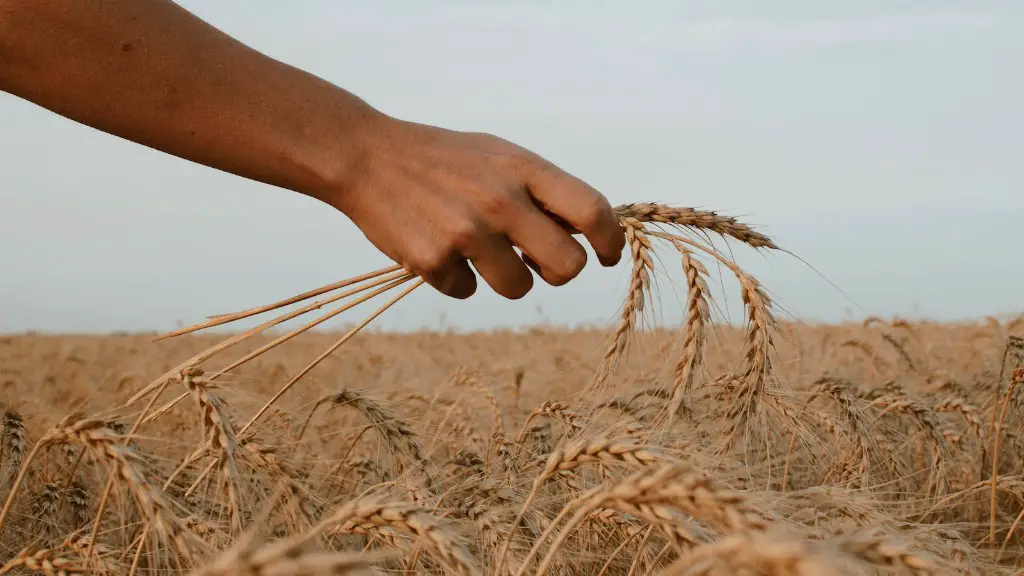The Minister of Agriculture in Trinidad and Tobago is the Honourable Clarence Rambharat, who has been in office since 2015. Mr Rambharat is part of the Progressive Empowerment Party (PEP) and hails from the Tunapuna/Piarco constituency. This makes him the first Minister of Agriculture since Trinidad and Tobago’s independence in 1962 to come from the constituency. Prior to his appointment, Mr. Rambharat was an attorney-at-law and a lecturer in law at the University of the West Indies. He has experience in both public and private law and brings to the position a much-needed understanding of both the concerns of lawyers and the diverse needs of rural agriculture stakeholders.
Mr. Rambharat’s tenure has seen the launch of multiple government initiatives aimed at diversifying the country’s agriculture sector. These initiatives include the Agricultural Innovation Strategy, which provides specialized technical assistance to small and medium-sized agricultural enterprises; the modernization of the TrinAgri irrigation system; and the establishment of a National Extension Services. The main objective of these initiatives is to help farmers become more efficient and productive, increase their incomes, and enable them to compete in an increasingly-globalized economy. The Ministry of Agriculture has also launched a number of capacity-building programmes, such as a farmer field school, a technology transfer centre, and a rural business incubator, which all focus on empowering local farmers with the knowledge, skills, and confidence to succeed in their enterprises.
In addition, the Ministry of Agriculture has implemented policies to encourage greater agricultural exports and foreign direct investment into the sector. These policies have been designed to open up new market opportunities for local farmers, strengthen their ability to export, and increase their access to the global marketplace. The TrinAgri Product Certification Scheme, which certifies organic produce and other products, enables local farmers to gain access to international markets. The Minister of Agriculture also launched a Sustainable Agro Enterprise INitiative (SAEIN) which supports innovative agro-enterprises through public/private partnerships in order to develop value-added products.
It is clear that Mr Rambharat’s tenure as Minister of Agriculture has seen the establishment of multiple government initiatives and policies to promote the growth and success of small to medium and large scale farming practices. His leadership has helped to improve access to resources and spur the development of agricultural technology, resulting in increased incomes and improved agricultural production. As such, Mr. Rambharat has proved to be an effective and committed agent of rural development and poverty alleviation.
Agricultural Innovation Strategy
The Agricultural Innovation Strategy (AIS) is one of the foremost initiatives taken by the Minister of Agriculture in Trinidad and Tobago to diversify the country’s agricultural sector. It provides specialized technical assistance to small and medium-sized agricultural enterprises and focuses on producing value-added products. The AIS also works to improve access to technology and resources such as fertilizers, new seed varieties, and best practices. The main objectives of the AIS are to improve productivity, create gainful employment, reduce poverty, and increase the competitiveness of Trinidadian farmers.
For example, the AIS has facilitated the establishment of a Plant Variety Protection office, which works to ensure the security of relevant plant varieties. This is of particular importance when it comes to the export of crops such as rice, bananas, and cassava. It also provides specialist agricultural extension services which are delivered to stakeholders through a number of mechanisms, such as on-site visits, seminars, and workshops. Furthermore, the AIS is responsible for the implementation of agricultural research projects, which explore new and emerging technologies that can be used by local farmers.
The AIS has also been instrumental in the development of agribusinesses in Trinidad and Tobago. It has encouraged collaborations between the private sector, farmers, and local governments. In particular, it has fostered the growth of value-added agricultural enterprises, such as fish farming, poultry, and pig breeding. In addition, it has promoted the development of agricultural cooperatives, which provide farmers with access to goods and services that are otherwise out of reach. This has helped to increase access to capital and new markets for these enterprises.
Overall, the Agricultural Innovation Strategy has enabled the Minister of Agriculture in Trinidad and Tobago to help diversify the agricultural sector and spur inclusive growth. It has facilitated the establishment of services, such as the Plant Variety Protection office and specialist agricultural extension services, and encouraged the development of agribusinesses and cooperatives. As a result, farmers have been empowered to increase their income, grow exports, and enter global markets.
Modernization of TrinAgri
The TrinAgri Irrigation System is a critical infrastructure system that has been in operation since Trinidad and Tobago’s independence, and is the backbone of food production and food security in the country. The Minister of Agriculture, Clarence Rambharat, has pledged to modernise the system, and has already made significant strides in that direction.
Under the leadership of Mr. Rambharat, the Ministry of Agriculture has undertaken a wide-ranging review of the TrinAgri system in order to identify areas that require urgent improvement. This review has allowed the Ministry to understand the current state of the irrigation system, identify problems, and develop realistic plans for modernisation. As part of the modernisation process, the Ministry has proposed introducing state-of-the-art technologies, such as remote sensing and geospatial data analysis, in order to better manage the use of water for irrigation and to ensure efficient delivery of irrigation services.
In addition to introducing new technologies, the modernisation effort has also focused on the installation of automated systems, which are designed to reduce the intensity of the manual labour needed for the management of the irrigation system. This means that the system can be left to operate independently, with minimal human intervention. This is expected to translate into cost-savings, as well as improve the efficiency of delivery of services.
In order to ensure proper implementation of the modernisation program, the Ministry of Agriculture has established a framework that ensures that the process is constantly monitored and reviewed. Specific measures have also been introduced to ensure that proper levels of transparency and accountability are maintained. These measures include the development of a feedback mechanism, improved training for technical personnel, and increased coordination between stakeholders.
The modernisation of the TrinAgri system is a major undertaking, and the efforts of the Minister of Agriculture in Trinidad and Tobago are to be commended for their commitment to modernising and improving the system. By introducing state-of-the-art technologies, establishing independent operations, and introducing measures to ensure proper implementation, the Minister has shown a clear commitment to the improvement of the irrigation system.
National Extension Services
The National Extension Services (NES) is an initiative of the Ministry of Agriculture in Trinidad and Tobago, led by Minister Clarence Rambharat. It seeks to promote the study and practice of agriculture in schools and communities across the country. NES works to empower individuals and groups in their pursuit of personal and economic development, focusing on improving agricultural production, income generation, and marketing.
To this end, NES has integrated a range of activities under the umbrella of agricultural training and education. These activities include basic agricultural skills training, business management and marketing training, agricultural machinery and tools training, as well as specific topics such as food safety and organic farming. These sessions are offered at various locations around the country including schools, prisons, and community centres, and are also available online.
The NES also provides support services to existing and aspiring entrepreneurs in the agricultural industry. These support services include access to finance and legal advice, as well as access to market and market information. The objective of these services is to advise and guide agribusinesses down the path to success. To this end, the NES has established multiple partnerships with both the public and private sectors in order to facilitate the growth of agribusinesses in Trinidad and Tobago.
The NES has a long-term vision for the growth of the Caribbean agricultural sector, and has taken significant steps to realise this. It has worked actively to develop educational materials and programmes that promote sustainable farming practices and a greater appreciation of the value of agriculture in the Caribbean. It has also advocated for a greater investment in research and development, and has worked to keep the public informed about current agricultural initiatives and policies.
The National Extension Services has been instrumental in promoting the study and practice of agriculture in Trinidad and Tobago. By providing training in agriculture and business management and offering support and access to markets, the NES has enabled individuals and groups to pursue economic development and create sustainable livelihoods. As such, this initiative has been critical in achieving some of the goals of the Minister of Agriculture in Trinidad and Tobago, Clarence Rambharat.
Farmer Field School
The Farmer Field School (FFS) is an extension system developed by the Ministry of Agriculture in Trinidad and Tobago and led by Minister, Clarence Rambharat. The FFS is designed to enhance the professional development of local farmers and promote sustainable agricultural practices. The school is part of the Ministry’s long-term commitment to improving outcomes in the agricultural industry, and is helping to provide small to medium-scale farmers with the skills and knowledge that are necessary for success in the global market.
The FFS operates in a participatory learning environment, which is designed to be conducive to a learner-centred approach. Through the FFS, farmers gain access to new technologies, best practices, and market intelligence. The school utilises a mix of traditional and modern methods of instruction, including fieldwork, discussions, demonstrations, and multimedia. The majority of FFS programmes are open to all ages and are free of charge.
Aside from imparting knowledge and skills, the FFS also works to provide access to new markets and to improve the income of the farmers. Through collaboration with the private sector, the FFS works to develop business opportunities and link farmers to agribusinesses and processors. This helps to reduce marketing costs and to increase market revenues for the farmers. The FFS has also actively advocated for the adoption of sustainable agricultural practices, such as crop rotation and the conservation of soil, water, and biodiversity.
The Farmer Field School is an important initiative within the Ministry of Agriculture in Trinidad and Tobago, led by Minister Clarence Rambharat. It provides farmers with the skills and knowledge that are necessary to compete in the global market, as well as facilitates the development of agribusinesses and access to new markets. It also helps farmers to adopt sustainable practices and ensure the conservation of land, water, and biodiversity. Thus, the FFS has been a driving force in improving outcomes in the local agricultural industry.
Technology Transfer Centre
The Technology Transfer Centre (TTC) is an initiative of the Ministry of Agriculture in Trinidad and Tobago and is led by Minister Clarence Rambharat. The TTC is designed to help local farmers and agribusinesses access the latest technologies and best practices to improve their productivity and competitiveness. The TTC works in partnership with the private sector, educational institutions, and government agencies to promote the use of technological innovations in the agricultural sector.
The TTC has a wide range of activities that it conducts in the service of its mission. These include facilitating technology demonstrations and demonstration farms, providing access to training and technical assistance, and facilitating technology transfer through the identification and sharing of technological information. In addition, the TTC provides information about funding and investment opportunities for agribusinesses. It also organises seminars, workshops, and field days to help farmers and agribusinesses familiarise themselves with the latest developments in agricultural technologies.
The TTC has collaborated with a number of private organisations, including research centres and universities, in order to improve access to knowledge and resources. In particular, they have worked with the University of the West Indies and the Trinidad and Tobago Innovation Council to create a platform that links innovators to people in need of technological services. This platform provides farmers and agribusinesses with a variety of resources that are otherwise out of reach.
The Technology Transfer Centre has been instrumental in improving the productivity





